System Storage Benchmarks
For our SSD comparisons, we are comparing similar PCIe Gen5 x4 NVMe SSDs in this performance tier; all the SSDS on the graph are PCI-Express 5.0 x4 NVMe SSDs. Notably, the MSI SPATIUM M580 FROZR and M570 PRO FROZR and CORSAIR MP700 PRO, and ADATA LEGEND 970 are all using Phison E26 controllers, the previous generation, so this makes for a comparison to the previous generation.
3DMark
We are using 3DMark’s Storage Benchmark which tests common gaming workload traces. The benchmark tests loading Battlefield V, Call of Duty Black Ops 4, and Overwatch. It tests moving games by copying a Steam folder for CS:GO, and installing Outer Worlds from the Epic Games Launcher, and saving game progress in The Outer Worlds. It tests recording a 1080p gameplay video at 60FPS with OBS while playing Overwatch. We will graph the Overall Benchmark Score, higher is better.
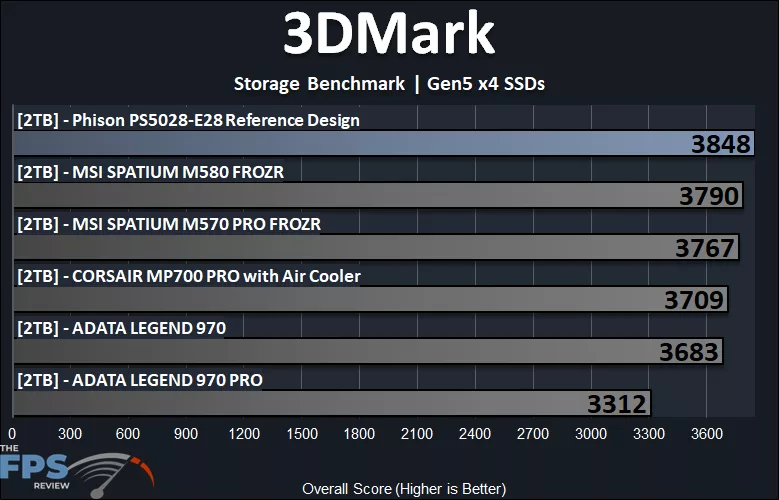
In our review, in the 3DMark Storage Benchmark, the Phison PS5028-E28 Reference Design 2TB SSD performed the highest, delivering a score of 3,848. This is 2% above the MSI SPATIUM M580 FROZR and MSI SPATIUM M570 PRO, which were top performers with the E26 controller in this benchmark. It’s 4% over the CORSAIR MP700 PRO, and above the ADATA LEGEND 970 and destroys the ADATA LEGEND 970 PRO at 16%, which is rated at 14,000 sequential read speed, but does use the InnoGrit IG5666 controller. This benchmark is very intensive, and seeing the Phison PS5028-E28 Reference Design 2TB on top here paints a strong picture starting off, since the Phison E26 controller SSDs were already very good in this benchmark.
PCMark 10
We are using PCMark 10’s Full System Drive Storage Benchmark. It outputs an overall score (higher is better) that is derived from the Bandwidth (higher is better) as well as access time (lower is better) results.
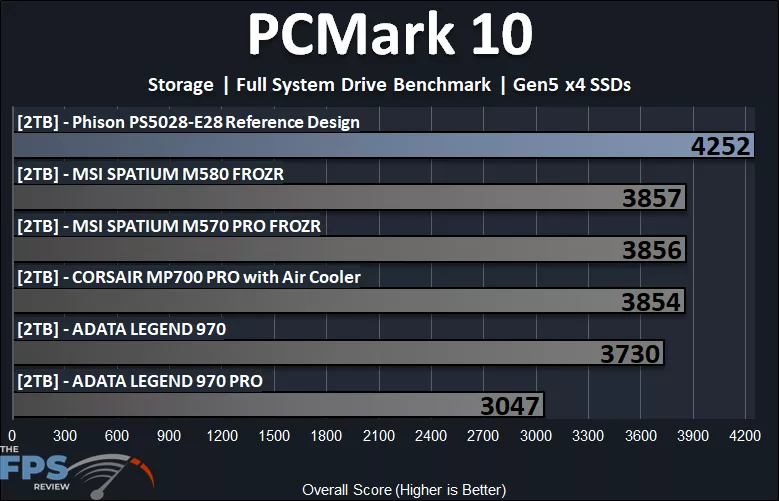
In PCMark 10’s full system drive storage benchmark, the Phison PS5028-E28 Reference Design 2TB is once again on top, but not only that, it has a much more distinct performance bump over the previous generation Phison E26 controller SSDs in this benchmark. With a score of 4,252, it is 10% above the MSI SPATIUM M580 and M570 PRO and CORSAIR MP700 PRO SSDs, and 14% above the ADATA LEGEND 970 and smashes the ADATA LEGEND 970 PRO at 40%.
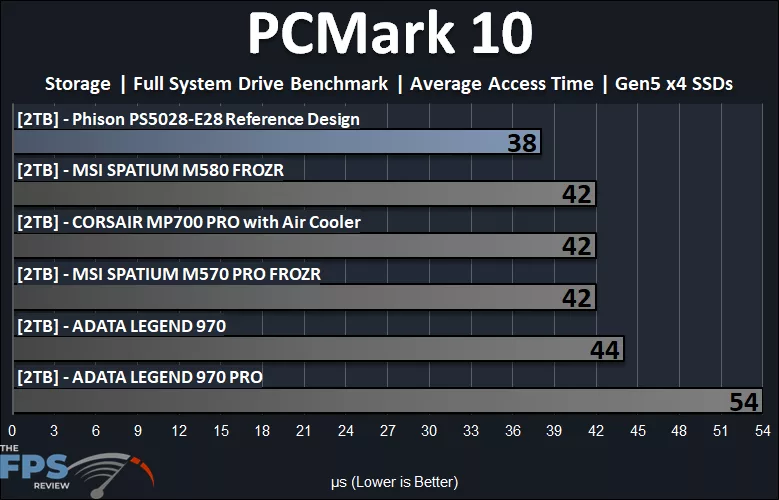
There is a reason for the Phison PS5028-E28 Reference Design 2TB SSD performing so well in this test, and that is down to the very fast latency. The Phison PS5028-E28 Reference Design 2TB SSD has the lowest latency, and is 10% lower in latency compared to the other Phison 26 controller-based SSDs. That poor InnoGrit controller on the ADATA LEGEND 970 PRO suffers from very bad latency.
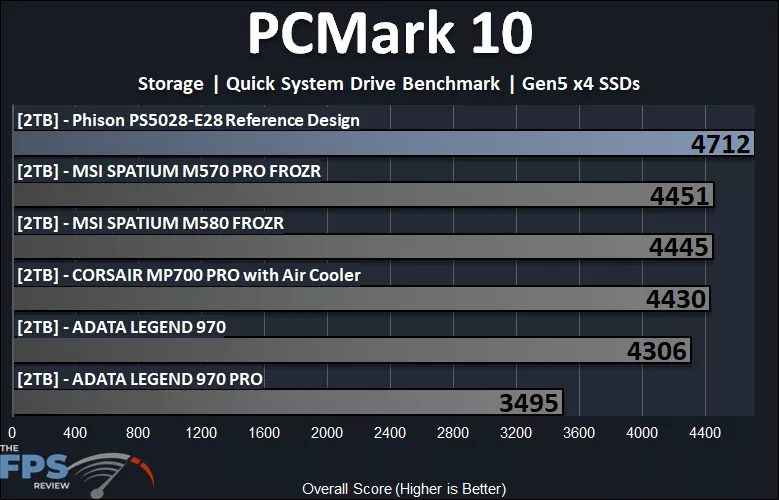
PCMark 10’s quick system drive storage benchmark focuses on smaller workloads, and typically, this is where we see the benefit of a DRAM cache. Indeed, the Phison PS5028-E28 Reference Design 2TB SSD pulls in a very strong score in this benchmark at 4,712, once again topping the charts. It is 6% above the MSI SPATIUM M570 PRO and M580 FROZR, and CORSAIR MP700 PRO, and 9% over the ADATA LEGEND 970. It smashes the ADATA LEGEND 970 PRO at 35%.
PassMark PerformanceTEST
We are using PassMark’s PerformanceTEST Disk Mark benchmark only. This test benchmarks Disk Sequential Read, Disk Sequential Write, IOPS 32KQD20, IOPS 4KQD1 tests and outputs an overall score (higher is better.)
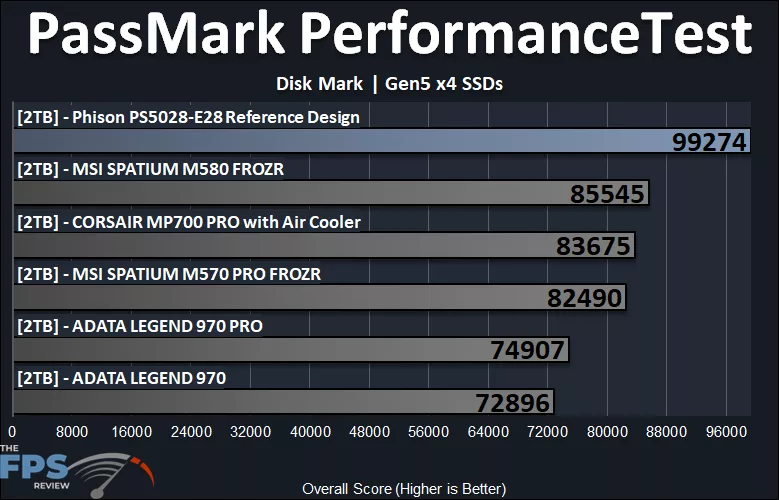
In PassMark PerformanceTest Disk Mark, this benchmark takes everything into consideration, including small workloads, large workloads, access time, and DRAM cache. The Phison PS5028-E28 Reference Design 2TB SSD by far pulls in the highest numbers we’ve ever seen in this benchmark, smashing all other SSDs here. We didn’t believe this test at first, and ended up running it 10 times to confirm this insane performance, and it was very consistent. The Phison PS5028-E28 Reference Design 2TB SSD is 16% above the MSI SPATIUM M580 FROZR and 19% above the CORSAIR MP700 PRO, 33% above the ADATA LEGEND 970 PRO, and 36% above the ADATA LEGEND 970.
